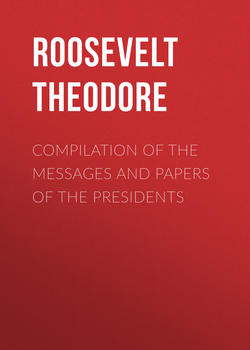Compilation of the Messages and Papers of the Presidents

Реклама. ООО «ЛитРес», ИНН: 7719571260.
Оглавление
Roosevelt Theodore. Compilation of the Messages and Papers of the Presidents
Theodore Roosevelt. September 14, 1901
Theodore Roosevelt
VICE-PRESIDENT ROOSEVELT'S INAUGURAL ADDRESS AS VICE-PRESIDENT
MESSAGE
PROCLAMATIONS
BY THE PRESIDENT OF THE UNITED STATES OF AMERICA
BY THE PRESIDENT OF THE UNITED STATES OF AMERICA
BY THE PRESIDENT OF THE UNITED STATES OF AMERICA
BY THE PRESIDENT OF THE UNITED STATES OF AMERICA
BY THE PRESIDENT OF THE UNITED STATES OF AMERICA
BY THE PRESIDENT OF THE UNITED STATES OF AMERICA
BY THE PRESIDENT OF THE UNITED STATES OF AMERICA
BY THE PRESIDENT OF THE UNITED STATES OF AMERICA
BY THE PRESIDENT OF THE UNITED STATES OF AMERICA
BY THE PRESIDENT OF THE UNITED STATES OF AMERICA
BY THE PRESIDENT OF THE UNITED STATES OF AMERICA
BY THE PRESIDENT OF THE UNITED STATES OF AMERICA
BY THE PRESIDENT OF THE UNITED STATES OF AMERICA
BY THE PRESIDENT OF THE UNITED STATES OF AMERICA
BY THE PRESIDENT OF THE UNITED STATES OF AMERICA
BY THE PRESIDENT OF THE UNITED STATES OF AMERICA
BY THE PRESIDENT OF THE UNITED STATES OF AMERICA
BY THE PRESIDENT OF THE UNITED STATES OF AMERICA
BY THE PRESIDENT OF THE UNITED STATES OF AMERICA
BY THE PRESIDENT OF THE UNITED STATES OF AMERICA
EXECUTIVE ORDERS
Отрывок из книги
Theodore Roosevelt, the twenty-seventh President of the United States, was born in the city of New York, October 27, 1858. His ancestors on the paternal side were of an old Knickerbocker family, and on the maternal side of Scotch-Irish descent. He was educated at home under private tuition and prepared for matriculation into Harvard, where he was graduated in 1880. He spent the year of 1881 in study and travel. During the years 1882-1884 he was an assemblyman in the legislature of New York. During this term of service he introduced the first civil service bill in the legislature in 1883, and its passage was almost simultaneous with the passage of the Civil Service Bill through Congress. In 1884 he was the Chairman of the delegation from New York to the National Republican Convention. He received the nomination for mayor of the city of New York in 1886 as an Independent, but was defeated. He was made Civil Service Commissioner by President Harrison in 1889 and served as president of the board until May, 1895. He resigned to become President of the New York Board of Police Commissioners in May, 1895. This position, in which the arduous duties were discharged with remarkable vigor and fearlessness, he resigned in 1897 to become Assistant Secretary of the Navy. On the breaking out of the Spanish-American War in 1898, he resigned on May 6, and, entering the army, organized the First United States Volunteer ("Rough Rider") Regiment of Cavalry, recommending Col. L.G. Wood to the command, and taking for himself the second-in-command as lieutenant-colonel. He had gained his military experience as a member of the Eighth Regiment of N.Y.N.G. from 1884-1888, during which time he rose to the rank of captain. The Rough Riders were embarked at Tampa, Fla., with the advance of Shafter's invading army, and sailed for Cuba on June 15, 1898. They participated in every engagement preceding the fall of Santiago. Theodore Roosevelt led the desperate charge of the Ninth Cavalry and the Rough Riders at the Battle of San Juan Hill on July 1. He was made a colonel on July 11. He received the nomination on September 27, 1898, for Governor of the State of New York, obtaining 753 votes, against 218 for Gov. Frank S. Black. At the election Theodore Roosevelt was supported by a majority of the Independent Republicans and many Democrats, and defeated the Democratic candidate, Judge Augustus Van Wyck, by a plurality of 18,079. At the Republican Convention, held at Philadelphia in June, 1900, he was nominated for Vice-President, upon which he resigned the governorship of New York. Was elected Vice-President in November, 1900, and took the oath of office March 4, 1901. President McKinley was shot September 6, 1901, and died September 14. His Cabinet announced his death to the Vice-President, who took the oath of President at the residence of Mr. Ansley Wilcox in Buffalo, before Judge John R. Hazel, of the United States District Court, on September 14.
MARCH 4, 1901.
.....
The second object of a proper immigration law ought to be to secure by a careful and not merely perfunctory educational test some intelligent capacity to appreciate American institutions and act sanely as American citizens. This would not keep out all anarchists, for many of them belong to the intelligent criminal class. But it would do what is also in point, that is, tend to decrease the sum of ignorance, so potent in producing the envy, suspicion, malignant passion, and hatred of order, out of which anarchistic sentiment inevitably springs. Finally, all persons should be excluded who are below a certain standard of economic fitness to enter our industrial field as competitors with American labor. There should be proper proof of personal capacity to earn an American living and enough money to insure a decent start under American conditions. This would stop the influx of cheap labor, and the resulting competition which gives rise to so much of bitterness in American industrial life; and it would dry up the springs of the pestilential social conditions in our great cities, where anarchistic organizations have their greatest possibility of growth.
Both the educational and economic tests in a wise immigration law should be designed to protect and elevate the general body politic and social. A very close supervision should be exercised over the steamship companies which mainly bring over the immigrants, and they should be held to a strict accountability for any infraction of the law.
.....